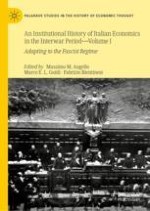
2019 | OriginalPaper | Chapter
Italian Economics and Fascism: An Institutional View
Authors : Massimo M. Augello, Marco E. L. Guidi, Fabrizio Bientinesi
Published in: An Institutional History of Italian Economics in the Interwar Period — Volume I
Publisher: Springer International Publishing
Activate our intelligent search to find suitable subject content or patents.
Select sections of text to find matching patents with Artificial Intelligence. powered by
Select sections of text to find additional relevant content using AI-assisted search. powered by